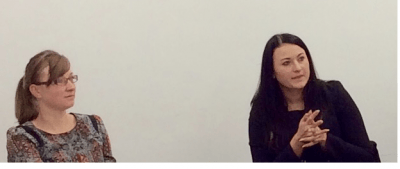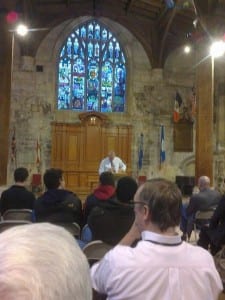 On 14th January Lincoln Business School hosted a small workshop to discuss the experiences of people that have moved into Lincolnshire from other parts of Europe. We were privileged to here from two Polish entrepreneurs (pictured above) who have established businesses in Lincolnshire; Iwona Lebiedowicz has launched her own recruitment agency and translation service while Paulina Babuchowska was part of a partnership that ran a Polish shop in Lincoln. Both told us their personal stories and it was evident that these were highly talented and motivated individuals. As well as pursuing their own careers, with a strong emphasis on personal training and education, they also explained how this helped them to integrate into the wider business community as well as to provide important services to others in the region.
On 14th January Lincoln Business School hosted a small workshop to discuss the experiences of people that have moved into Lincolnshire from other parts of Europe. We were privileged to here from two Polish entrepreneurs (pictured above) who have established businesses in Lincolnshire; Iwona Lebiedowicz has launched her own recruitment agency and translation service while Paulina Babuchowska was part of a partnership that ran a Polish shop in Lincoln. Both told us their personal stories and it was evident that these were highly talented and motivated individuals. As well as pursuing their own careers, with a strong emphasis on personal training and education, they also explained how this helped them to integrate into the wider business community as well as to provide important services to others in the region.
Professor Ian Barnes set out some earlier research into the experiences of earlier migrants in Lincolnshire, highlighting opportunities to update and refine our understanding now that EU borders have been open for 10 years. His research noted that the UK offered easier opportunities for starting a business and that this, along with informal network support within migrant communities, had seen a significant level of entrepreneurship developing.
We were also joined by Carey Doyle, a PhD researcher from Queen’s University in Belfast. Her study is exploring the relationships between space, place and identity in the towns of Boston (Lincolnshire) and Dungannon (Northern Ireland). Each town has seen similar decreases (approx. 94% to 84%) of the population born in the relevant region between 2001 and 2011 as a result of migration from Central and Eastern Europe. In particular, her research is exploring interesting political questions about the impact of migration in more rural regions that have been less exposed to such trends in the past.
Our fifth speaker, Nicola Radford from Lincolnshire County Council, explained that it can be difficult to reach out to non-native groups through publicly funded business support programmes. Technology hubs and funding for coastal communities offer grants and business advice but the take up among in-migrants is low, despite a range of innovative marketing efforts. This informs the ongoing research of our own PhD Student, Mahdieh Zeinali, who explained that she is researching the function of entrepreneurship as a vehicle of integration.
Our final speaker, Dr Agnieszka Rydzik, presented research into migrant employees, noting that their identity was shaped by their place of origin and in a number of cases this created “glass ceilings” for their career progression. This could be one of the motivations for pursuing further training and subsequently establishing new businesses here in the UK.
Further ahead, the degree of mobility and the interrelated social and economic networks that develop between the old and new homes of entrepreneurial migrants can provide the basis for new research into entrepreneurial behaviour, community cohesion and wider patterns of globalization.

